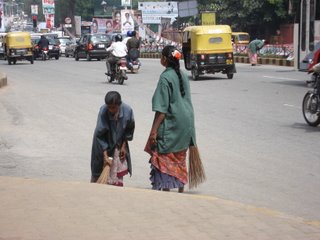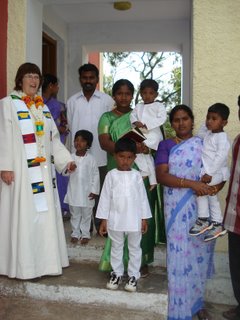
was celebrated 2 weeks ago, when I was in Channapatna.
"Girl child"? What's with that? you may wonder...It certainly sounds strange to western ears, and the fact that there's a whole Sunday set aside by CSI to address the rights and needs of girls is a powerful reminder that India is a very different context from home. For all my delight in the Indian experience and my envious admiration of the beauty of my Indian sisters (why, oh why can't the west adopt fashions as universally flattering as the sari or salwar?) I wouldn't want to swap lives with them for all the tea in Darjeeling.
Girl Child Sunday is necessary because in India six years into the 21st century, the prevailing attitude to women remains firmly medieval. Women's work is the foundation of every Indian home, with mothers rising at dawn to draw water (even close to Bangalore, mains water is not only undrinkable but often non-existent for much of each day, so vessels must be filled to meet all domestic needs whenever the water actually does flow), then spending a good hour cooking the traditional Indian breakfast. (I've really struggled with the overwhelming hospitality that insists on three cooked meals a day, with numerous snacks in between - bizarrely, being thoroughly overfed so put me off food that I've actually managed to lose weight...not sure quite how it worked, but it's rather pleasing all the same).
From then on, for the Indian housewife, it's drudgery all the way. Housework (every home seems to need sweeping on a daily basis), more cooking, shopping for fresh food every day, more cooking...all to serve the men of the house, whether husbands, sons or fathers.
Domestic violence seems habitual in the poorer homes, with drunkenness compounding the problem,- it was commonplace to step round insensible shapes sprawled on the pavements,- and women have no escape from this, as to leave your husband is to cut yourself off from family and community, and ensure that you can no longer call anywhere home.
Only once her sons marry can a woman acquire a higher status for a time as a mother-in-law, making daughters-in-law miserable in their turn,- but with widowhood, high-caste women may find themselves non-persons again, traditionally condemned to shaven heads, white saris, sleeping on the floor and spending their time in prayer for their departed husbands, with no possibility of remarriage. In an interview a woman, widowed when she was still in her twenties lamented the outlawing of the custom of sati, for, she said " Swift oblivion has to be preferable to decades of living death" and sati matas are traditionally revered as akin to saints.
Even in westernised homes, where both partners work, the expectation is that the woman will undertake all domestic tasks on top of her career. I really struggled when clergy wives, coming in at 9.00 pm from a day's teaching and a long commute from the city immediately set to work serving the evening meal, waiting on husband, father and guests (including me). Nobody even suggested that a little help could be offered, and the culture of service seems completely non-negotiable. Repeatedly I was told "It's our privilege and pleasure to serve our menfolk"...and too bad if it isn't.
Against this background, it is maybe not surprising that female infanticide remains a problem. While in the past fathers might seek to evade the demands of providing a dowry by killing their new-born daughters, today it more like to be the mother who opts to abort a girl-child, not wanting to bring another woman into the world to suffer as she herself has suffered.
Modern medical techniques make this so easy that there is a real potential for gender imbalance in Indian society, such that the government has just launched a means-tested scheme to offer grants to girls on their eighteenth birthday.
But unless there is a radical change of attitude, it will never be easy for Indian women. Wherever we went, I was conscious of their labour, from our hostesses, eating in the kitchen long after the rest of us had relaxed at table, or the array of sweepers and labourers carting loads of bricks on their heads on the building sites of Bangalore.

I'm aware, too, that it is the women who are the strong core of the church. It is the women who gather regularly for midweek prayer, the women who hand on the faith to their children...but though women were ordained in C.S.I. for 10 years before the vote went through here in England, they remain largely submissive in ministry too, serving in difficult contexts with scant support. Even in my rather bemusing role as a "foreign dignitory" (yes, I really was announced as such on several occasions!), I too was largely ignored if the men in our party were present. This had its plus side, as I was less of a target for beggars and street vendors, who assumed that I had no voice in decision making,- though it could be maddening too.
I know that there is some interesting work emerging from feminist theologians, and a growing recognition that women may be entitled to an identity beyond that of wife and mother...but it seems to me that there are many many miles to travel before I could be persuaded to change places with my sisters...On Girl Child Sunday, I was privileged to baptise 3 children,2 boys and a girl.

As always, the rite was sheer joy, but more than ever I found myself wondering and worrying about what might lie ahead for Nikith, Pranesh and Nisha, in that society that is so unlike my own, and praying that each of them might come to realise their infinite value as children of God,- sons and daughter.
1 comment:
Kathryn, what a beautiful closing image of you and the families. I'm not sure how different the division of labor is here, we just have more readily available conveniences.
Post a Comment